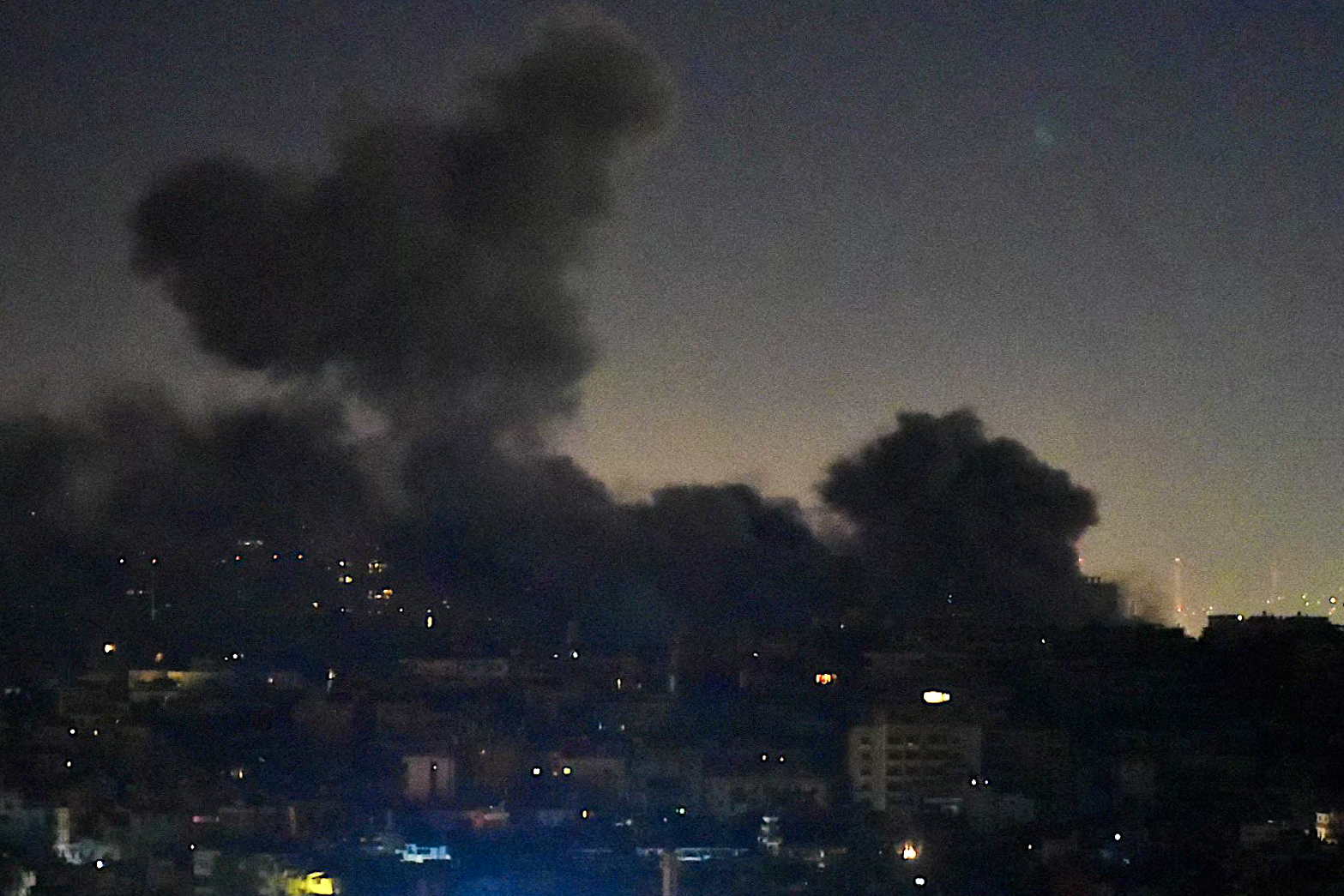Beirut/Manama/Washington — Lebanon’s health ministry said four people including a child had been killed on Monday evening in Israeli strikes near the country’s biggest public hospital close to the southern suburbs of Beirut.
“The Israeli enemy strike near the Hariri Hospital killed, in a preliminary toll, four people, including a child, and injured 24,” the ministry said, adding it had caused “significant damage to the hospital”.
A Lebanese security official told AFP that the country’s national airline had to switch landing strips on Monday after Israeli strikes near Beirut’s only international airport hit close to the main runway.
“Middle East Airlines switched the runway it was using because the main runway is close to the site of the Ouzai strike,” the official said, requesting anonymity to discuss sensitive matters.
The Israeli strikes on Hezbollah’s south Beirut bastion including for the first time on the Ouzai district on Monday, shortly after the Israeli army warned residents of several districts to evacuate.
“An Israeli air strike targeted the Ouzai area. This is the first targeting of the Ouzai district since the start of the Israeli aggression on Lebanon,” the National News Agency said.
The NNA also reported strikes on the Haret Hreik neighborhood, just south of Ouzai, and near Lebanon’s largest public hospital.
AFPTV footage showed plumes of smoke rising from Beirut’s southern suburbs, with AFP correspondents also hearing several loud bangs before the strikes.
Israeli military spokesman Avichay Adraee posted the new call on social media pointing out several locations to be evacuated, included an area close to Beirut airport.
“You are located near facilities and interests affiliated with Hezbollah that the IDF will work against in the near future,” he wrote.
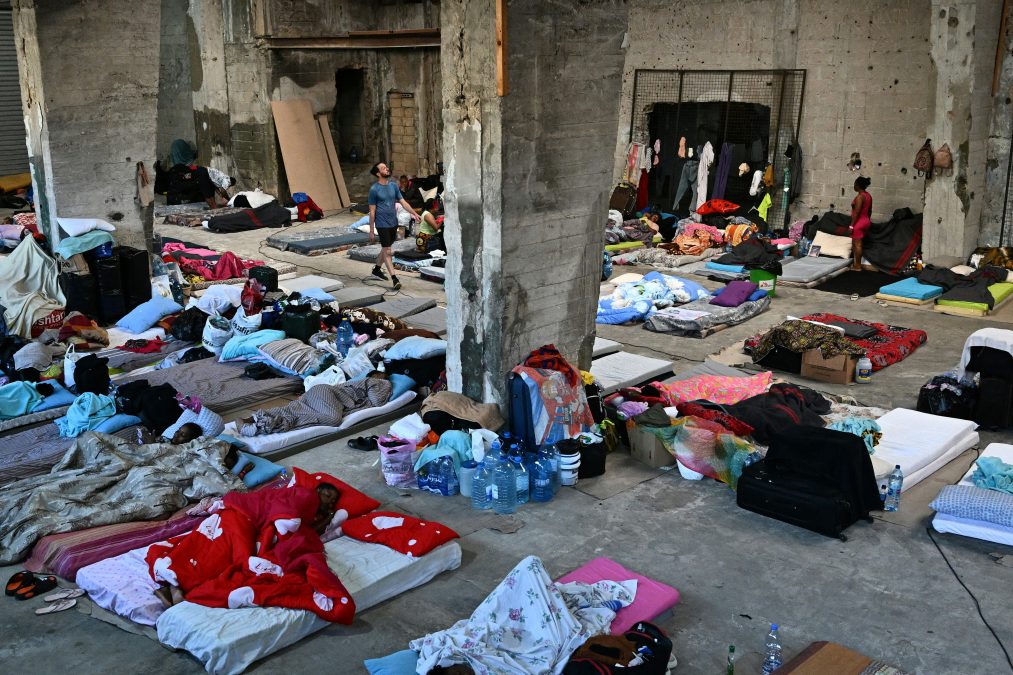
In another development, the Israeli military said about 170 projectiles were fired by Hezbollah from Lebanon into Israel on Monday, as Israeli forces targeted the group’s funding arm in a wave of air strikes.
“As of 23:00 (2000 GMT), approximately 170 projectiles that were fired by the Hezbollah have crossed from Lebanon into Israel today,” the military said in a statement.
On Monday, the Israeli army said that the latest commander responsible for funding the Lebanese Hezbollah group was “eliminated” in Syria.
The man, whose name was not released, headed the Iran-backed Hezbollah’s Unit 4400 that is “responsible for the transfers and the amount of funds” to the group through Tehran’s oil sales, Israeli army spokesman Rear Admiral Daniel Hagari said in a statement.
The commander was “eliminated” in Syria “a few hours ago”, he added.
IRANIAN FOREIGN MINISTER MEETS BAHRAIN’S KING
In Manama, Bahrain’s King Hamad bin Isa Al Khalifa received Iranian Foreign Minister Abbas Araghchi, state media reported, amid fears of conflict potentially spreading across the Middle East.
The pair “discussed bilateral cooperation and the latest regional developments, focusing on efforts to de-escalate tensions and reach peaceful solutions,” according to the official Bahrain News Agency.
Araghchi has for about two weeks been touring the region in a diplomatic effort to tamp down tensions with the region braced for Israel’s promised retaliation for arch-foe Tehran’s missile attack on October 1.
Iran has balanced calls for de-escalation with threats of a fierce response to any Israeli attack.
The Sunni kingdom of Bahrain, the smallest country in the Middle East, has repeatedly accused Iran of fueling unrest among its Shiite community — a claim which Tehran denies. Bahrain is a Shiite-majority country with Sunni-minority royal leadership.
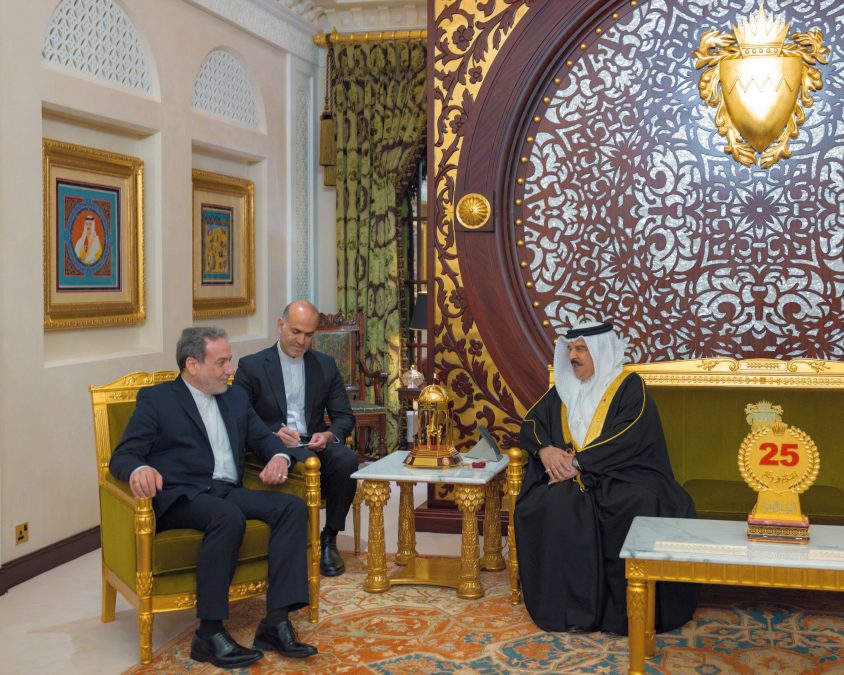
After departing Manama, Araghchi would travel to Kuwait, according to Iran’s ambassador to Kuwait, Mohammad Totonchi.
Araghchi’s tour of the region has also included Lebanon, Jordan, Syria, Saudi Arabia, Qatar, Oman, Iraq, Egypt and Turkey, where he discussed potential ceasefires in Lebanon and Gaza, as well as ways to prevent the conflict from spreading.
Bahrain cut ties with Iran in 2016, following in the footsteps of regional powerhouse Saudi Arabia after Riyadh’s diplomatic missions in Iran were attacked by protesters denouncing the Saudi execution of a prominent Shiite Muslim cleric Sheikh Nimr in the oil-rich eastern Saudi Arabia where the majority of Saudis are Shiites.
Shiite-majority Iran and Sunni-majority Saudi Arabia resumed ties in 2023 under an agreement that has shifted regional alliances. At the time, Tehran expressed its desire to re-establish diplomatic ties with Bahrain.
IRAN WARNS US OVER LOOMING ISRAELI ATTACK
Iran on Monday warned the United States would bear “full responsibility” in case of a retaliatory attack by Israel on the Islamic Republic after US President Joe Biden indicated he was aware of Israeli plans to do so.
Amir Saeid Iravani, Iran’s ambassador to the United Nations, called Biden’s remarks “profoundly alarming and provocative” in a letter addressed to United Nations chief Antonio Guterres and the Swiss presidency of the UN Security Council.
The US president responded “yes and yes” when asked Friday by a reporter if he had “a good understanding right now” of how and when Israel would respond to Iran’s missile barrage on October 1.
“This inflammatory statement (of Biden) is deeply concerning, as it indicates the United States’ tacit approval and explicit support for Israel’s unlawful military aggression against Iran,” Iravani wrote in the letter.
“Therefore, the United States will bear full responsibility for its role in instigating, inciting and enabling any acts of aggression by Israel against the Islamic Republic of Iran, in flagrant violation of the fundamental principles of international law and the United Nations Charter,” he said.
BLINKEN BACK TO MIDDLE EAST TO PUSH TRUCE
US Secretary of State Antony Blinken left for the Middle East Monday on a new push for an elusive Gaza ceasefire two weeks before US elections, seeing a new opportunity from Israel’s killing of Hamas’s leader.
It will be the 11th trip to the Middle East by the top US diplomat since war broke out a year ago, with Blinken on his last visit to Israel in August warning it may have been the “last chance” for a US-led ceasefire plan.
That push did not succeed, and the conflict has escalated and expanded since then, with Israel pounding Hezbollah targets in Lebanon and warning of a new strike directly on Iran, whose clerical leaders back both Hamas and Hezbollah.
US President Joe Biden, who personally laid out the ceasefire plan on May 31 that would also free hostages from Gaza, has seen new hope since Israel last week killed Hamas chief Yahya Sinwar.
Biden, speaking to reporters on a visit to Germany, said he called Prime Minister Benjamin Netanyahu to congratulate him and tell him that Blinken would head to the region.
“I told him that we were really pleased with his actions and, further, that now is the time to move on — move on, move towards a ceasefire,” Biden said Thursday.
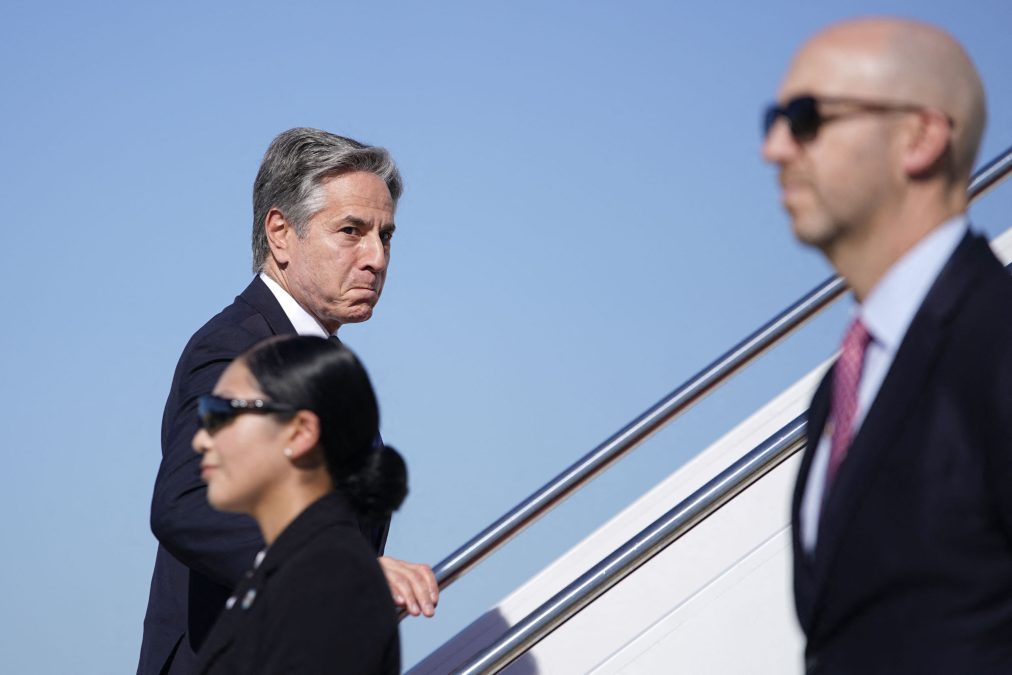
The Gaza war was sparked by the unprecedented Hamas attack on Israel last year that resulted in the deaths of 1,206 people, mostly civilians, according to an AFP tally of official Israeli figures.
Israel’s retaliatory campaign in Gaza has killed 42,603 people, also mostly civilians, according to data from the health ministry in the Hamas-run territory, figures the UN considers reliable.
Last month, Israel expanded its military operations to Lebanon, where at least 1,470 people have been killed since then, according to an AFP tally of Lebanese health ministry figures.
Blinken’s trip comes days after he and Defense Secretary Lloyd Austin warned Israel that the United States could withhold some of its billions of dollars in military aid unless more humanitarian assistance is allowed into Gaza, where the UN warns more than 1.8 million people are facing extreme hunger.
A breakthrough could be a major boost for US Vice President Kamala Harris, who is running in a razor-tight November 5 race for the White House against Donald Trump.
The war has been a political albatross for Biden and to an extent Harris, his political heir, with Netanyahu repeatedly brushing aside US entreaties to do more to spare civilians.
Trump also spoke to Netanyahu about Sinwar’s killing, with the Republican saying that the Israeli leader was proven right in ignoring Biden’s pressure to dial back military operations.
Trump suggested he would give freer rein to Netanyahu, telling reporters that Biden was “trying to hold him back and he probably should be doing the opposite.”
Trump staunchly backed Israel in his first term. He has a complicated relationship with Netanyahu but Republican voters, unlike Democrats, are overwhelmingly supportive of Israel and Netanyahu.
Blinken flies first to Israel and then will tour other countries in the Middle East through Friday.
An official on the plane with him said Blinken will visit Jordan on Wednesday and discuss humanitarian aid for the Gaza Strip.
The State Department did not list his other stops but on previous trips Blinken has visited a number of Arab countries, especially Qatar and Egypt, the key intermediaries in ceasefire negotiations.
Blinken “will discuss the importance of bringing the war in Gaza to an end, securing the release of all hostages and alleviating the suffering of the Palestinian people,” a State Department statement said.
It said Blinken would also discuss post-war arrangements critical for a peace deal and seek a “diplomatic resolution” in Lebanon, where the United States has stopped short of urging an immediate ceasefire.
Blinken has also sought to coax Netanyahu into compromise by dangling the prospect of normalization with Saudi Arabia — which would be a historic game-changer in Israel’s quest for acceptance, as the kingdom is the guardian of Islam’s two holiest sites.
Netanyahu, leading the most right-wing coalition in Israeli history, has called Sinwar’s death “the beginning of the end” of the Gaza war but faces calls from his base to keep up military operations in Gaza, which has already largely been reduced to rubble.
ISRAEL TARGETS SHIITE FINANCIAL INSTITUTION
The Israeli army said Monday its forces were pummeling Hezbollah’s financial arm, hitting more than two dozen targets including a bunker with tens of millions of dollars in cash and gold.
The strikes since Sunday night mark an expansion of Israel’s campaign against the Iran-backed group after a year of cross-border exchanges that escalated in late September into a full-blown war.
Israeli forces are now seeking to degrade the Shiite Muslim movement’s ability to fund its operations
“The Israeli Air Force carried out a series of precise strikes on these Hezbollah financial strongholds,” military spokesman Rear Admiral Daniel Hagari said in a televised briefing.
“One of our main targets last night was an underground vault with tens of millions of dollars in cash and gold. The money was being used to finance Hezbollah’s attacks on Israel.”
He did not specify whether all of the money was destroyed by the strike.
Hagari then referenced a separate bunker also allegedly filled with cash and gold under the Sahel hospital in the southern suburbs of the capital Beirut, but said the vault had not been targeted yet by the Israeli military.
“According to the estimates we have, there is at least half a billion dollars in dollar bills and gold stored in this bunker,” Hagari said.
“This money could and still can be used to rebuild the state of Lebanon.”
Fadi Alameh, who heads the hospital, told AFP that Israel’s “allegations are false.” He added that medical staff working in the emergency department, the only hospital unit still operating despite the dangers, were being evacuated.
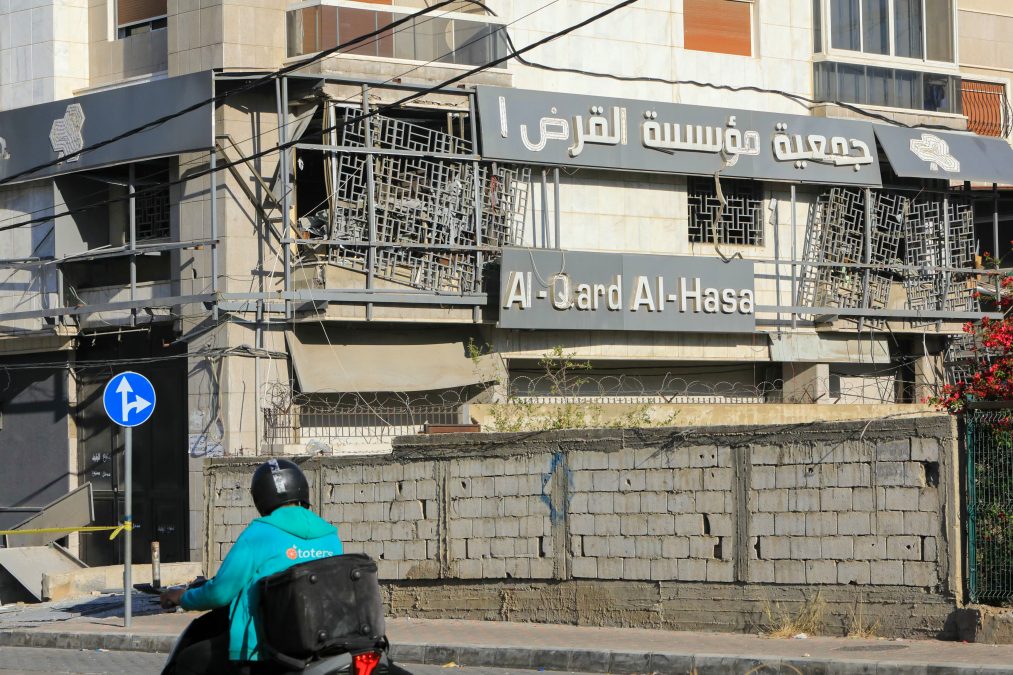
Alameh, who is also a lawmaker for Hezbollah ally Amal, said he was ready for the Lebanese army “or other observers” to come and inspect the hospital to prove the claims wrong.
Earlier Monday, Israeli military chief Lieutenant General Herzi Halevi said more than two dozen targets belonging to Al-Qard al-Hassan — a financial firm linked to Hezbollah — were hit. According to the Islamic Shariah principles, Al Qard Al Hassan is an interest-free loan to people in need, where the borrower pays the principal amount of the loan without interest. However, the US and Israel have claimed that Hezbollah was using the money for illegal activities, but on the other hand lower to middle-income groups in Lebanon used the so-called Hezbollah financial institution, Al-Qard al-Hassan, for interest-free loans.
“We struck close to 30 targets across Lebanon,” Halevi said in a statement after strikes began Sunday night against the US-sanctioned association that Israel accuses of financing “Hezbollah’s terrorist operations”.
The announcements came as the army said it continued to hammer an array of Hezbollah positions across Lebanon, including strikes against about 300 targets in the previous 24 hours.
Al-Qard al-Hassan is a lifeline for mainly Muslim communities battling a years-long financial crisis that has locked Lebanese out of their bank deposits.
The financial firm, officially registered as a charity, has been offering customers credit in exchange for gold deposits on an interest-free basis since the 1980s.
Its beneficiaries are mainly Shiite Muslims, but in a country where a five-year economic crisis has forced many into desperation, Christians and Sunni Muslims have also turned to its services.
The United States has long sanctioned the association, accusing Hezbollah of using it as a cover to mask its financial activities and gain access to the international financial system.
On Sunday evening, Israel struck Al-Qard al-Hassan branches in Beirut, the eastern Bekaa Valley and south Lebanon, Lebanese official media said.
Al-Qard al-Hassan says it has more than 30 branches nationwide, mainly in Hezbollah bastions including Beirut’s southern suburbs, but also in central Beirut and in other major cities such as Sidon and Tyre.
Israel in late September widened the focus of its military operations to Lebanon after nearly a year of war against Hezbollah’s Palestinian ally Hamas in the Gaza Strip.


